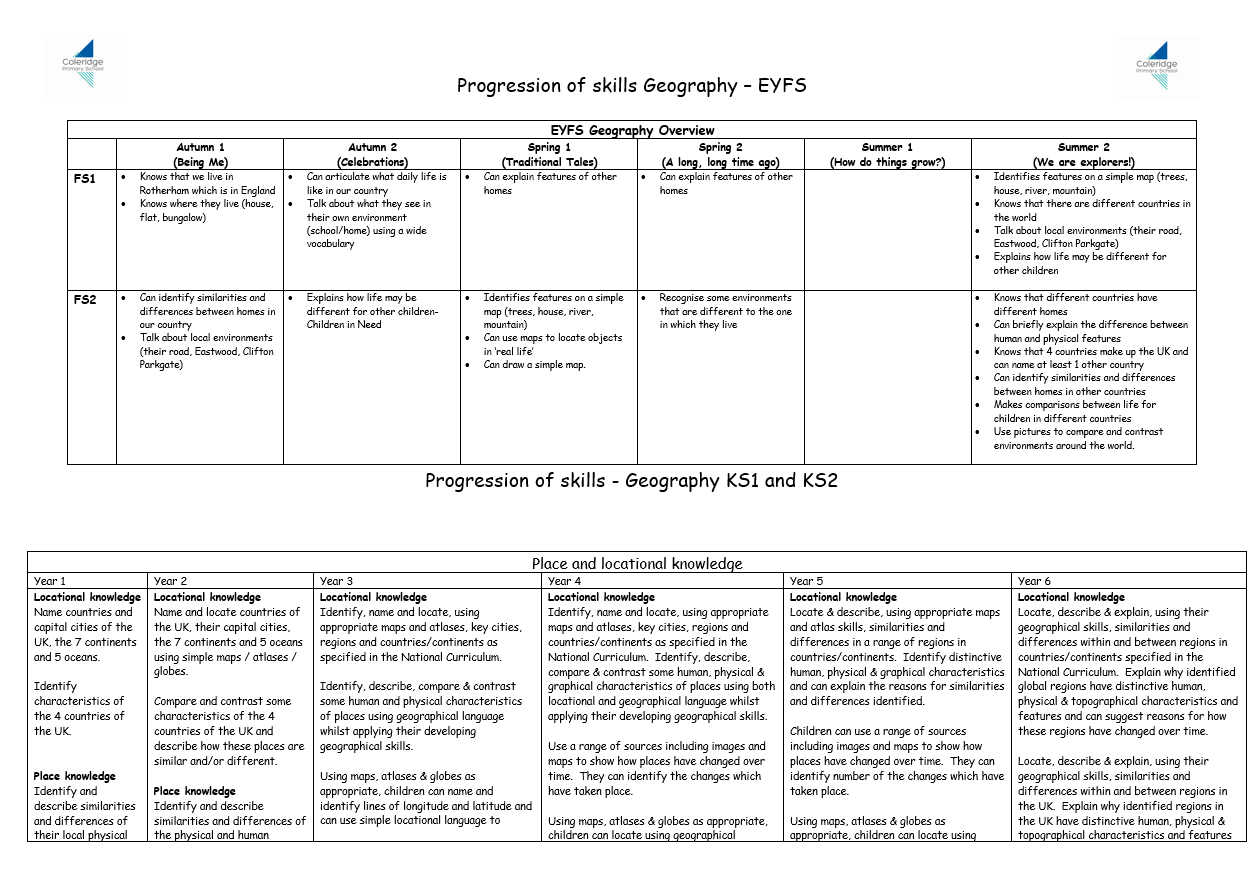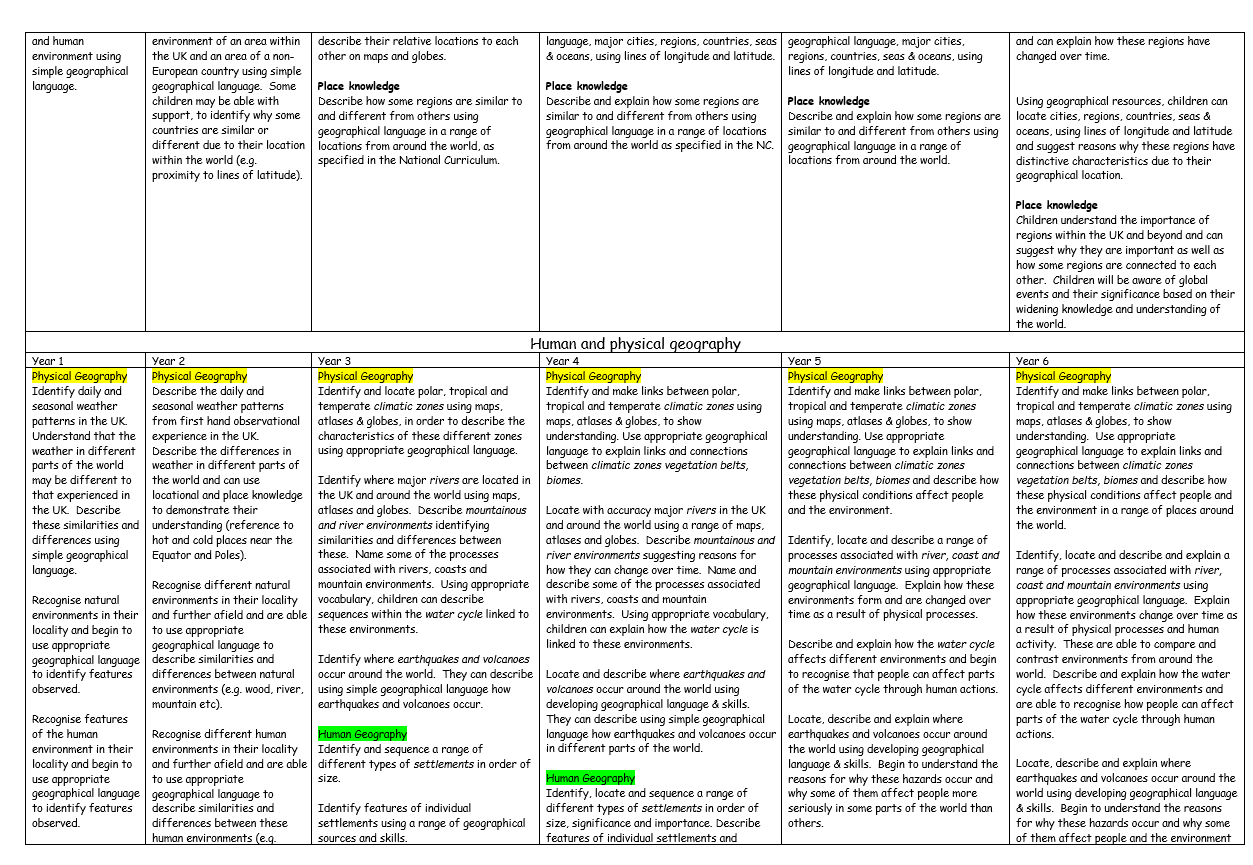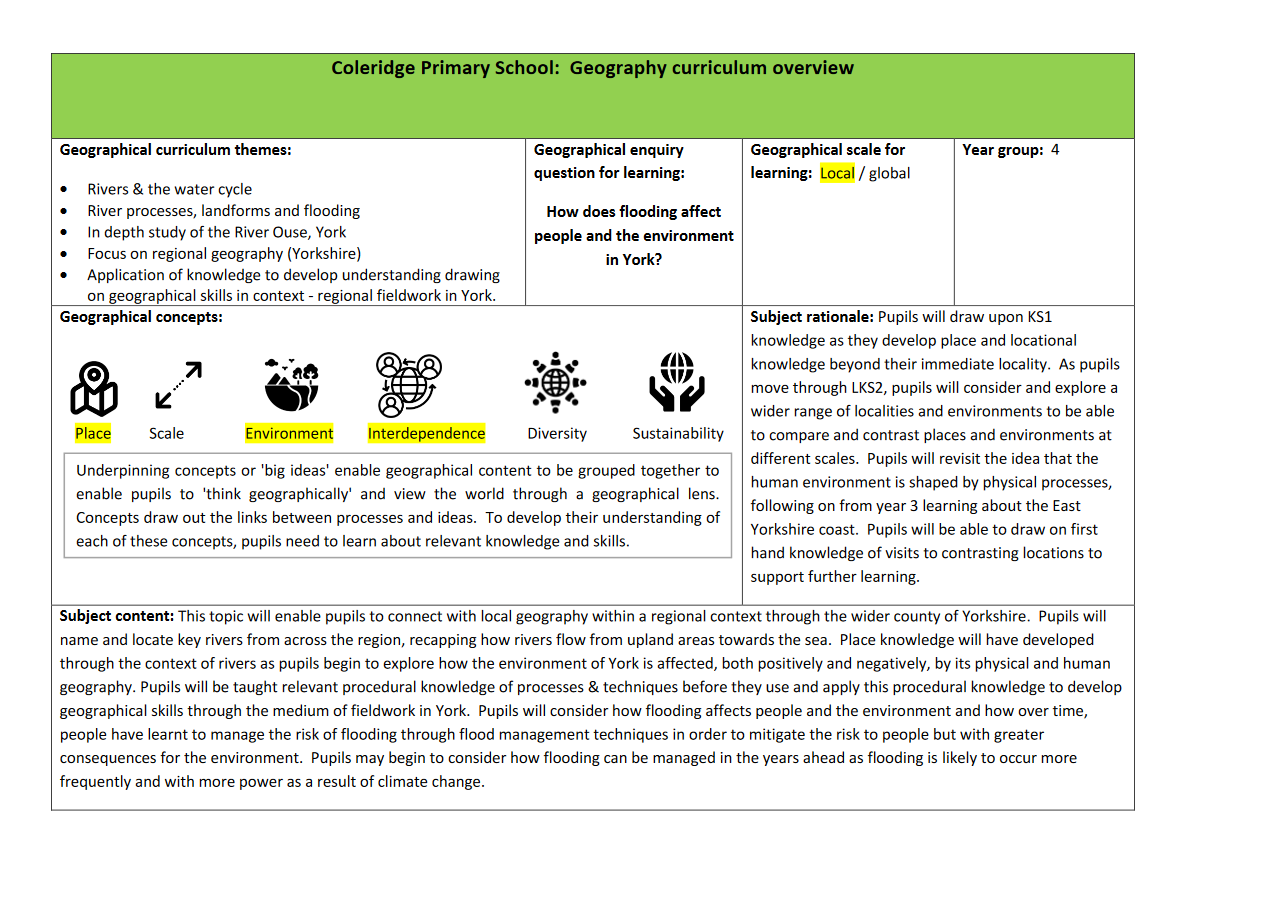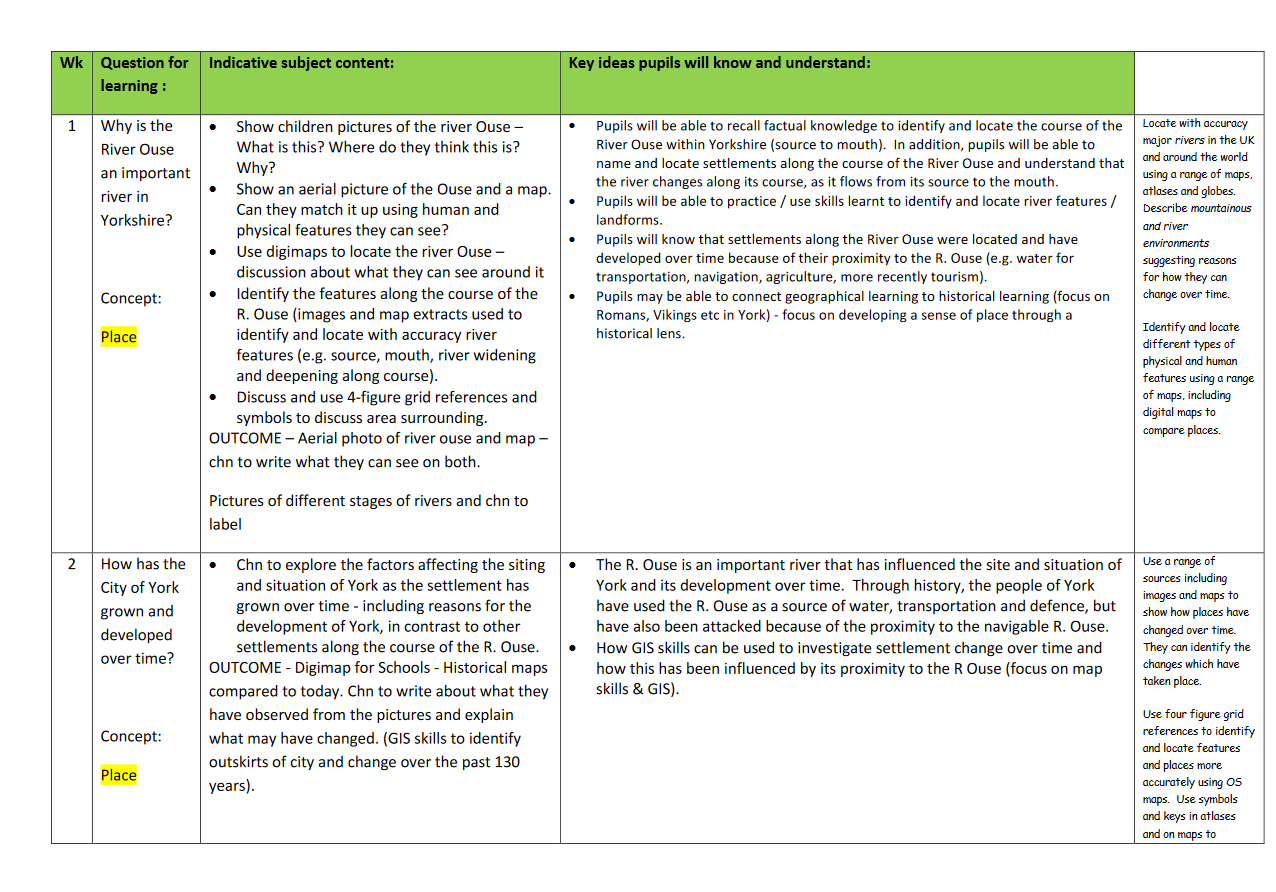Geography
Aims
The national curriculum for geography aims to ensure that all pupils:
- develop contextual knowledge of the location of globally significant places – both terrestrial and marine – including their defining physical and human characteristics and how these provide a geographical context for understanding the actions of processes
- understand the processes that give rise to key physical and human geographical features of the world, how these are interdependent and how they bring about spatial variation and change over time
- are competent in the geographical skills needed to:
- collect, analyse and communicate with a range of data gathered through experiences of fieldwork that deepen their understanding of geographical processes
- interpret a range of sources of geographical information, including maps, diagrams, globes, aerial photographs and Geographical Information Systems (GIS)
- communicate geographical information in a variety of ways, including through maps, numerical and quantitative skills and writing at length
Intent:
At Coleridge, we encourage our children to be inquisitive and question the information they are presented with, in order to further their geographical understanding. Geography is an exciting, enquiry led subject that helps the children to better understand people, places and environments in the world.
We have carefully constructed the curriculum in order to spark a curiosity and fascination about the world but also to help the children develop their own sense of identity. We will give children the opportunity to explore and understand their local area and use this knowledge to compare their life in this area with that of others around the world. Our curriculum will also enable the children to have first-hand experiences of the world and give them the opportunity to gain an appreciation of life in other cultures.
We strive for children to use a range of tools to understand their location and the landscapes of contrasting environments. Children have the opportunity to apply and embed these skills when conducting fieldwork in their local area.
Implementation:
To ensure high standards of teaching and learning in Geography, our curriculum is designed to allow children to build on their geographical knowledge and skills as they progress through the school. To help achieve this, our detailed units of work ensure that all teachers are equipped with the secure subject knowledge required to deliver high-quality teaching and learning opportunities for all areas of the geography curriculum. At Coleridge, we have a wonderfully diverse community and we use this to learn about different places around the world. Interwoven into the teaching sequence is the use of knowledge organisers which children can use as a support throughout the subject. These allow teachers to assess the different levels of understanding at various points in the lesson and also allow time to recap concepts where necessary, helping to embed learning.
Impact:
Within geography, we strive to create a supportive and collaborative ethos for learning by providing investigative and enquiry based learning opportunities. Emphasis is placed on investigative learning opportunities to help children gain a coherent knowledge of understanding of each unit of work covered throughout the school.
All children will use geographical vocabulary accurately and understand the different strands of geography, with a deep understanding of the Earth’s key physical and human processes. Children will begin to make relevant links from geography to other curriculum subjects, such as history and science. They will improve their enquiry skills and inquisitiveness about the world around them, and their impact on the world. All children will realise that they have choices to make in the world, developing a positive commitment to the environment and the future of the planet. Children will become competent in collecting, analysing and communicating a range of data gathered. They will be able to interpret a range of sources of geographical information and they will communicate geographical information in a variety of ways. All children in the school will be able to speak confidently about their geography learning, skills and knowledge.
Our Geography Curriculum is high quality, well thought out and is planned to demonstrate progression. After following the curriculum children will:
- Develop a deep knowledge, understanding and appreciation of their local area and its place within the wider geographical context
- Understand people, places and environments of the world, and the interactions between them.
- Develop an understanding how and why places are changing.
- Imagine, predict and work towards a world they would like to live in.
Cultural Capital
According to the national curriculum, cultural capital is the ‘essential knowledge that pupils need to be educated citizens, introducing them to the best that has been thought and said and helping to engender an appreciation of human creativity and achievement.’ (Ofsted School Inspection Handbook 2019).
We are confident that Geography lessons at Coleridge deliver the knowledge to enable children to function as well informed individuals who can engage with different aspects of society and thrive in the modern world.
Our Geography curriculum starts with a study in their local area but then extends to the wider world to broaden children’s minds and appreciation of different cultures. Every year group has access to high quality educational fieldwork visits outside of the classroom (both locally and further afield) to spark interest and excitement, ultimately increasing cultural capital. We also encourage family learning to take place during the term so that adults can experience their children’s Geography curriculum themselves and partake in the sharing of knowledge with their child.
Vision
We want our geography curriculum to promote a curiosity about the world for our learners. The curriculum will enable our learners to be confident to understand and ask questions about the world around them. We endeavour for Geography to be learned inside and outside of the classroom. Learning will be developed from the three core which are’ Geographical Skills linked to fieldwork, Places and Location Knowledge and the Understanding of Human and Physical Geography. Learners will ‘think like a geographer’.
When developing our geography curriculum we wanted to focus on embedding a skills based curriculum that would develop skills in a wide range of geographical contexts. We were acutely aware that our children needed to develop their understanding of human and physical geographical features through fieldwork whilst also ensuring they had a secure knowledge of places and location knowledge. The diagram below illustrates how we ensured all our geography sessions are linked.
Geography at Coleridge
In foundation stage, Geography is taught through the curriculum area ‘Understanding the World,’ which also links in other subjects including science and history. Children are encouraged to experience the world around them and to investigate plants and animals they may see in their outdoor areas. They also have the opportunity to draw these observations, label them, create houses for them and also create models of them. Children are exposed to the beginnings of map work in foundation stage and are encouraged to look at what they see closely in order to draw it accurately.
In Key Stage 1, the local area around Coleridge is looked into in more detail to help the children to understand the world around them. Fieldwork is arranged in which children learn to draw and interpret maps in order to complete fieldwork effectively. Other sources of geographical information are used including world maps, atlases, globes, aerial photographs and ICT equipment. The children will also learn about the weather patterns in the United Kingdom and hot and cold areas of the world.
In Key Stage 2 there is an opportunity to build on previous skills by focussing on three main areas:
- Locational knowledge
- Place knowledge
- Human and physical geography
Locational knowledge equips the children with the skills to identify places using different sources of geographical information. Children will use maps to focus on Europe and North and South America. Skills will be developed in order to locate the countries of the United Kingdom and their capitals.
Geographical similarities and differences are examined under the place knowledge section of the curriculum by comparing the geography of a region of the United Kingdom with a region in a European country and with a region in either North or South America.
The children will observe the human and physical features of their local community and also that of one further afield. They will understand key aspects of geography and begin to examine the human impact on the environment.
Geography mash up
Due to the vast amount of skills covered in the Geography curriculum, we wanted to introduce a new aspect of learning in which the children were given the opportunity to consolidate key skills and embed them over time. Geography Mash Ups, similar to Maths Mash Ups, are used as a rapid recall, interactive sessions in which teachers are able to address gaps in learning and also ensure that key objectives are clearly embedded.
Geography Mash Ups incorporate the use of a range of sources of geographical information including maps, diagrams and globes. The main strands of a Geography Mash Up session include:
- Using and interpreting maps
- Map purpose and use
- Direction and location
- Pre-learning for upcoming sessions.
Geography Mash Ups are invaluable when it comes to children cementing their learning and embedding key skills. Due to the constant practise of skills, children will become more fluent and confident meaning they are able to recall answers or find information quickly.
Resources
All children have access to a wide variety of geographical resources. Children have access to compasses, class sets of atlases, globes and other resources that will support children’s learning. Most of these resources will be referred to and used in sessions to develop a secure understanding of the resources needed to support children’s geographical skills.
Fieldtrips
Each half term, a geographical fieldtrip will commence and this will link to the teachers big question. We have planned out these fieldtrips carefully to ensure that children can use their newly acquired skills in a variety of contexts. Children have planned routes using OS maps, took part in traffic surveys, conducted public questionnaires or compared to contrasting environments whilst looking at human and physical features. These fieldtrips are a key driver in our geography curriculum and help embed the skills children have developed.
Country of the week
In each KS1/2 class we focus on one country that week. Children are given specific facts about the country and are encouraged to learn more about its capital city, largest river, famous landmarks and the continent it’s in. This focus runs alongside Geography Mash-up and will help enhance children’s places and location knowledge.
Curriculum Map
Here is an example of our curriculum map for Year 1 and Year 5 which includes the geographical concepts used throughout our curriculum

At Coleridge we understand the importance of knowledge organisers and how they can support children’s understanding and learning.
They are also an excellent assessment tool which can help identify gaps in learning and inform planning, teaching and intervention. As we have developed our own curriculum, class teachers have also developed knowledge organisers to work alongside our curriculum. Children will be encouraged to refer to knowledge organisers throughout sessions to help support and enhance their learning.
Knowledge organisers can be a valuable tool for both children, staff and parents. Class teachers are the ones who write the knowledge organiser, to set out their expectations of what pupils should learn about a topic – and to clarify their own thinking around what is important.
School leaders, headteachers and subject leaders then may look at a series of knowledge organisers to check for progression and continuity both within and across curriculum subjects and to ensure standards and expectations for learning are being implemented, and if not, what CPD is required.
Pupils will review, revise and quiz themselves using their knowledge organisers. Knowledge organisers are a really clear and easy to understand way for parents to be more aware of what their children are learning and thus to support them.
Some of the benefits of knowledge organisers
- A knowledge organiser makes the teacher think hard about what will be taught.
- Knowledge organisers are an endless source of meaningful homework activities.
- Knowledge organisers are an excellent tool for inclusion.
- Knowledge organisers create opportunities for spaced retrieval practice.
- Ahead of a summative assessment at the end of a topic you can inform pupils that some of the questions will refer to previous learning; pupils can then refer to the knowledge organiser to access and practice those topics.
- Used appropriately, knowledge organisers can increase retention of facts
At Coleridge, we have several non-negiotiables that need to be included in a knowledge organiser, they are:
- Key vocabulary (linked to Progression of language)
- Key places and people
- Useful diagrams (as required for the topic)
- Key dates for a subject like history (e.g. when the two World Wars were)
- Key themes
- Important quotes
- Stem sentences for a subject like Science or Maths
We use knowledge organisers throughout school, however, in EYFS they look different to other phases of school due to the away the curriculum is structure. In EYFS, we use a holistic approach to knowledge organisers and have a topic knowledge organiser, whereas, in KS1 and KS2 our knowledge organisers are subject specific.
If you would like any information about our knowledge organisers then please contact us at enquiries@coleridgeprimary.org
Useful resources for Geography
- https://www.rgs.org/schools/ – Royal geographical society
- https://www.geography.org.uk/ – Geographical association
- https://www.kids-world-travel-guide.com/ocean-facts-for-kids.html – Kids world travel guide
These are examples of Medium Term Planning





















